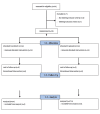Effect of Probiotics on Allergic Rhinitis: A Randomized, Controlled, Clinical Trial
- PMID: 34466612
- PMCID: PMC8343930
- DOI: 10.31661/gmj.v9i0.1918
Effect of Probiotics on Allergic Rhinitis: A Randomized, Controlled, Clinical Trial
Abstract
Background: Allergic rhinitis (AR) is one of the most common diseases in the world and affects about 10-50% of the general population. Probiotics are live microorganisms that help the normal state of the intestine, and if prescribed correctly, they can stimulate the mucosal immune system to prevent inflammatory symptoms of allergy and atopy. The present study aims to investigate the role of probiotics in the treatment of AR when added to standard therapy as adjuvant agents.
Materials and methods: In this clinical trial study, 28 patients older than 15 years with AR randomly divided into probiotics and control groups. The probiotics group received standard therapy for AR accompanied by probiotic capsules every 12 hours for eight weeks, whereas the control group received standard therapy for AR with placebo capsules as the same protocol. Data were analyzed using SPSS Version 23 (IBM Corporation, Armonk, NY, USA) and, the P-value less than 0.05 was considered statistically significant.
Results: In the probiotics group, 14.3% of patients had sneezing at the baseline, which significantly decreased to 4.6% (P<0.01). Also, the necessity for nasal and oral corticosteroids after treatment with probiotics in the probiotics group was less than the control group (P<0.01). Although cough, nasal discharge, conchae hypertrophy, and night sleep disorders reduced after treatment with probiotics, this reduction was not statistically significant between the two groups.
Conclusion: Based on the results of this clinical trial, the use of probiotics had no significant effect on the outcome of patients with AR.
Keywords: Adult; Allergic Rhinitis; Probiotics.
Copyright© 2020, Galen Medical Journal.
Similar articles
-
Treatment with a Probiotic Mixture Containing Bifidobacterium animalis Subsp. Lactis BB12 and Enterococcus faecium L3 for the Prevention of Allergic Rhinitis Symptoms in Children: A Randomized Controlled Trial.Nutrients. 2021 Apr 16;13(4):1315. doi: 10.3390/nu13041315. Nutrients. 2021. PMID: 33923532 Free PMC article. Clinical Trial.
-
Efficacy of Bimin decoction for patients with perennial allergic rhinitis: an open-label non-inferiority randomized controlled trial.Trials. 2019 Dec 30;20(1):802. doi: 10.1186/s13063-019-3763-z. Trials. 2019. PMID: 31888713 Free PMC article. Clinical Trial.
-
Probiotics and Allergic Rhinitis: A Simon Two-Stage Design to Determine Effectiveness.J Altern Complement Med. 2016 Dec;22(12):1007-1012. doi: 10.1089/acm.2016.0115. Epub 2016 Oct 12. J Altern Complement Med. 2016. PMID: 27732056
-
Research Advances in the Treatment of Allergic Rhinitis by Probiotics.J Asthma Allergy. 2022 Oct 7;15:1413-1428. doi: 10.2147/JAA.S382978. eCollection 2022. J Asthma Allergy. 2022. PMID: 36238950 Free PMC article. Review.
-
Probiotics in the treatment and prevention of allergies in children.Biosci Microflora. 2011;30(4):119-28. doi: 10.12938/bifidus.30.119. Epub 2011 Nov 17. Biosci Microflora. 2011. PMID: 25045317 Free PMC article. Review.
References
-
- Lin W-Y, Fu L-S, Lin H-K, Shen C-Y, Chen Y-J. Evaluation of the effect of Lactobacillus paracasei (HF A00232) in children (6–13 years old) with perennial allergic rhinitis: a 12-week, double-blind, randomized, placebo-controlled study. Pediatr Neonatol. 2014;55(3):181–8. - PubMed
-
- Peng Y, Li A, Yu L, Qin G. The role of probiotics in prevention and treatment for patients with allergic rhinitis: A systematic review. Am J Rhinol Allergy. 2015;29(4):292–8. - PubMed
-
- Jan R-H, Chen C-J, Chen L-K, Wen S-H, Lin T-Y. Is the effect of probiotics on allergic rhinitis confined to Dermatophagoides farinae, Dermatophagoides pteronyssinus, or dust-sensitive children? A randomized prospective double-blind controlled trial. Ci Ji Yi Xue Za Zhi. 2011;23(2):51–4.
LinkOut - more resources
Full Text Sources
Research Materials


